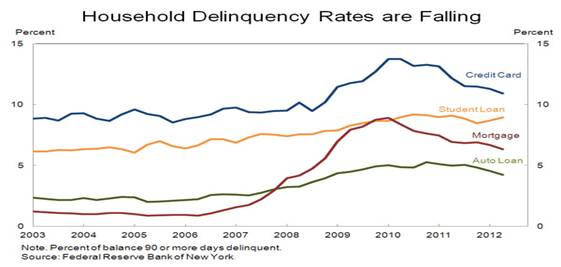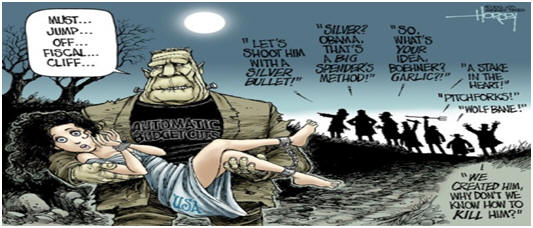www.aljazeerah.info
Opinion Editorials, November 2012
Archives
Mission & Name
Conflict Terminology
Editorials
Gaza Holocaust
Gulf War
Isdood
Islam
News
News Photos
Opinion Editorials
US Foreign Policy (Dr. El-Najjar's Articles)
www.aljazeerah.info
US Fiscal Cliff:
No More than Juggling with Tax Expenditures
By Henry D'Souza
Chairman of the Federal Reserve Ben Bernanke coined the term “fiscal cliff” in 2012 and Robert Rubin, 1 who served under Clinton’s two Administrations as Secretary of State, and was a Wall Street man explained that “fiscal cliff” referred to spending cuts and tax hikes that are being discussed in accordance with the Simpson-Bowles formula. The bi-partisan Simpson-Bowles committee2 on finance recommended that the ratio should be at least $ 2.00 of spending cuts for every $ 1.00 of revenue increase.
However, Bernanke’s should have used “cliff” earlier, in 2008, when President Obama encountered a collapse of the banking sector, Wall Street, a housing crisis, and the demise of the motor industry, an American flagship. Bernanke and Obama’s Treasury Secretary Timothy Geithner solved this unprecedented crisis by printing money, so that in each of the last four years the deficit exceeded $1 trillion. The Treasury pumped money into the economy three times, with Quantitative Easing (QE) 1, QE 2, and QE 3.
Deficits ($) Under
Bush
Obama
FY 2009: 1,413 b
2013: 901 b
2008: 459 b
2012: 1,089 b
2007: 161 b
2011: 1,300 b
2010: 1,293 b
Source: Christopher Chantrill, “Limit to annual
deficits in US,” usgovernmentspending.com
Official figures on federal deficits are deceptive when the Bush2 deficits are compared with Obama’s; the former fought unfunded wars so that expenditures on wars are not in the budget, while Obama insisted on transparency in the accounting system, though his too was limited.
Some critics suggest that “cliff” is not the best word since the effects of belt-tightening will be felt gradually. “Fiscal slope” would be a better title. ABC News seems fixated on taxes hence, “taxmageddon” for fiscal cliff.3 Whatever the interpretation, “cliff” suggests that the situation is desperate and the Fed can no longer print money. “The stakes are high” warns Bernanke.
Masters4 suggests that the recent era starts with Bush-era tax cuts, post 9/11 spending on wars, TARP bailouts, the Recovery Act, new entitlements, new policies pursued during the financial crisis and the subsequent downturn.
During this era, Americans in all walks of life have been spending as if there were no tomorrow. One indication is the rise of the national debt.
The Congress-set national debt ceiling of $14.295 trillion was reached on May 16, 2012. With juggling, the nation could manage within this target until August 2. The ceiling is currently at $16.2 trillion: public-held debt was $11.35 trillion and intra-governmental debt was $4.85 trillion. Majority leader in the Senate Harry Reid wants the ceiling to be raised to $18 trillion, a sign of desperation. Since 1962, the ceiling has been raised 74 times. Treasury Secretary Timothy Geithner suggests the elimination of a ceiling - a dangerous and unacceptable idea.
5To pay for this debt, the US has to borrow from
financial institutions and nations that have excess cash.
Foreign governments hold $4.4 trillion worth of debt in the form
of financial instruments. China is the largest foreign creditor
($1.16tr). Next comes Japan ($1.11tr), oil producing countries hold $261
billion, and Brazil, fourth largest, holds $242 billion.6
Some sectors, like the Pentagon, do not think that borrowing is
a disadvantage, while others feel that it is gross liability.
Pollock7 warns us that a “substantial
amount of federal borrowing is not counted in the budget, like Agency
Debt. Examples of such debt
include Fannie Mae, Freddie Mac, and other off-budget agencies, which
rely on US debt. All this debt influences interest rates for these
securities.
Every annual deficit adds to the national debt.
The annual deficit of $1.1 trillion is unsustainable.
The fiscal cliff seeks to reduce the deficit to $641b from $1.1
trillion in 2012, a decline of $487 b.
A reduction of the national debt is laudable, but this amount is
not enough.
In addition, almost all states are bankrupt and
find difficulty in paying the extended unemployment benefits that Obama
legislated. These “shadow
bailouts” for just 32 states amount to $37.8 billion: California ($6.9
b), Michigan ($ 3.9 b), and New York ($ 3.2 b) are the largest three
that needed help.8
Households also carry a lot of debt.
By July 2012, household debt amounted to $11.28 trillion, while
the delinquency rate was 9%.
The breakdown is as follows: mortgages: $463 b; student loans,
$914 b; and, credit cards and consumer credit balances equaled $672 b.9
National debt, annual deficits, bankruptcies of
all 50 states, and household debt all lead Bernanke to claim that the
“stakes are high.”
Mediation between the two parties has to be a priority.
Gridlock, as in the previous four years, is not in the nation’s
interest.
The US needs savings of $ 2 trillion annually so
that the national debt can be halved by the end of the Obama era.
Half of it should come from the military and the other half from
tax revenues and spending cuts. This target may seem impossible but it
is achievable even though it might lead to a depression in the short
run. The very thought that
the US has this target in mind will restore confidence in the global
finance markets. Obviously
those laid off should have some kind of security net.
Let us examine what solutions have been proposed.
Should Congress not come up with a solution by the end of December 2012, the fiscal cliff measures will operate from January 2013, so as to yield at least $607 b. The non-partisan Tax Policy Centre also notes that on average each household will pay $3,400 extra per year.10
Xtra tax breakdown
Average Income:
xtra tax
Average Income: xtra tax
Average Income: Xtra tax
$11, 239:$ 412
29, 204: 1,231
49, 842: 1,984
80, 080: 3,540
178,020: 14,173
1.3million: 120,537
Source: Rick Newman
Secretary of Defense Leon Edward Panetta proposed a defense budget cut of $487 billion or 8% from planned defense spending over a decade. He suggested that the fiscal cliff, or Sequestration, would add $492 b.
Retired Army Lieutenant General David Barno would add about $200b to Panetta’s proposal by a policy of Constrained Global Presence. A Stimson Center Defense panel would go further by adding $500 b to Panetta’s figures “with acceptable level of risks.” These adjustments show that the Pentagon could yield at least $1 trillion annually for the next decade.
Two facts should be remembered at this point. The first is that the US military budget is 40% of worldwide expenditure on the military or equals the expenditure for the next 14 top expenditures, and most of them are US allies. This exorbitant expenditure shows that the defense budget needs to go through a juice extractor.
The second fact is that the military budget is hidden in different Departments, so that Pentagon’s figures are most likely deflated. Nuclear weapons come under the Department of Energy, the drone franchise is under the CIA budget, satellites are under NASA, benefits come under Veteran Affairs, and so on.11
These two facts show that Obama can obtain a lot of juice from the military. He would, of course, be accused of being a coward, a communist, a socialist and a stingy born-again un-American President of the USA.
For the next 4 years, the budget should be balanced annually, with 10% going into a fund, so that any borrowing should only equal what is in this fund, and that too in exceptional circumstances. Obviously other measures are needed to combat a recession. One has to agree with Alex Seitz-wald that Grover Norquist’s anti-tax Republican lobby will be in decline in today’s fiscal crisis.12
As Rubin pointed out the “tax expenditure goose doesn’t have enough golden eggs.” Fiscal cliff, as used by Americans, is basically about juggling with tax expenditures, but this is not enough. A drastic short-term remedy to halve the national debt is needed so as to squeeze $2 trillion annually from the economy for the next four years. This is a more cavalier approach than the one Obama is taking.
There is one important change that should be in the works. Obama was elected by grassroots supporters, who should be recruited to participate in government. Paid local officials should involve locals to make suggestions to the Democratic Party about the major problems of the day. This is just one way that the President would have his ear to the ground.
November 30, 2012
© Henry D’ Souza, #601-3700 Kaneff
Crescent, Mississauga, ON, L5A 4B8
Images will be deleted when
commercialized
Criticism welcome
IMAGES




T. Geithner
Robert Rubin
Cartoon by chinadaily.com


Leon Panetta Grover Norquist

Presented by Karen Dynan, V-P & Co-director
Economic Studies, brookings.edu, September 6, 2012.

|
|
|
|
||
|
||||||


